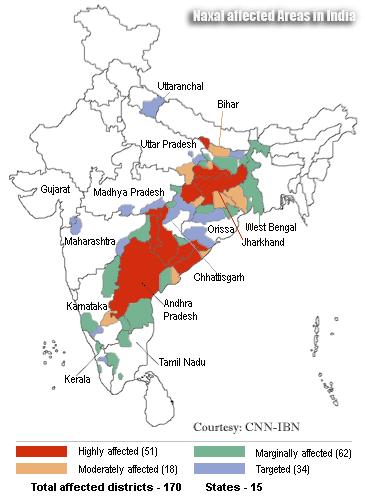
Naxalism, synonymous with Left Wing extremism, has come to pose the single biggest threat to India's internal security.
Who are Naxals? What is their ideology? An appreciation of these twin interlinked questions would help us understand the violent nature of the Naxal movement.
A peasant uprising and the birth of Naxalism
The word "Naxalism" comes from the name of a West Bengal village, Naxalbari, which in 1967 witnessed a failed peasant uprising, led by Charu Mazumdar, a firebrand Communist leader. The uprising was started after a tribal youth, who had a judicial order to plough his land, was attacked by local landlords. The local tribal group retaliated and started forceful recapture of their lands. The CPI(M) -led government in West Bengal, backed by the Central Government, cracked down on the uprising and in 72 days of the rebellion, one policeman and nine tribesmen were killed.
"Naxals believe in Mao's dictum: "Power flows from the barrel of a gun."
This incident echoed through out the country and Naxalism was born.
The movement assumed larger dimensions, when the state units of CPI(M) in U.P., J&K, & some sections of the state units in Bihar and Andhra Pradesh joined the struggle. What started purely as a agrarian dispute with a basis in the prevailing socio-economic conditions, has today assumed multiple hues of varied ideologies.
"Naxalism thrives in places where the people are disillusioned with the establishment's indifferent attitude towards their welfare"
Ideology: Power through the barrel of a gun
Naxalism, given its voilent nature and stated aims, is a 'political ideology', and not a 'socio-economic movement dedicated for the upliftment of the poor.' Naxals believe in Marxist-Lennist as well as Maoist ideologies. These twin ideologies extol violence as a means to "seize political power"
Naxalism has always debunked democracy and its institutions. The bullet, and not the ballot, the Naxals believe, is the means to seizure the State power.
The abject failure of successive governments to address the deplorable socio-economic conditions in backward rural areas, especially the Naxals hold considerable sway, have only made it easy for the Naxals to exploit the poor and illiterate people to further their own cause.
Naxals operate in Dense forests, which are ideally suited to carry out Guerrilla warfare. The ideal conditions include a local population alienated due to their exploitation by vested interests like landlords, moneylenders, contractors, and lower-end bureaucracy, difficult terrain facilitating "hit and run" operations and, above all, the lack of effective grassroots administration.
Between then and now, Naxals have only strengthened their position.What has disturbed the intelligence agencies is the fact that these Naxal organisations have established strong network linkage with the Maoist in Nepal, the LTTE in Sri Lanka(the secessionist outfit is more or less defunct now), and Left Wing extremist groups in Philippines.


No comments:
Post a Comment